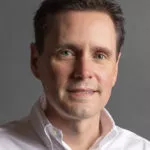Economic uncertainty has been the coin of the realm, so to speak, at least since the beginning of the pandemic. Can dentistry still consider itself mostly impervious to a downturn? The 2023 Incisal Edge 40 Under 40 have some thoughts to share.
By Edward Kobesky
FOR DECADES, we’ve been told that dentistry can withstand extraordinary economic turbulence. We’ve been told this because, well, it’s true. But small cracks have been showing. Consolidation in the form of DSOs and large group practices would seem to indicate that economies of scale have become increasingly important to sustained profitability. Plus, the number of solo practitioners is shrinking, and fewer students enter dental school with the dream of someday becoming a young practice owner.
That may sound ominous, but there’s also a big disconnect between industry trends and those willing to buck them. Dr. Daniel Leach, an oral surgeon in South Carolina and a 2022 Incisal Edge 40 Under 40 honoree, told us last year that his generation is successfully pushing back against what he characterized as “DSO rhetoric” and starting practices anyway. “Every one of my colleagues—including myself—who have done just that are doing quite well,” he said. The climate this year feels largely the same.
Investors don’t seem worried, either. Discussing global health care private equity, partners at the business strategy consultancy Bain & Company recently reported that “specialties like veterinary, dental, radiology, oral surgery and vision have historically been less affected in a downturn, making them interesting investment opportunities this go-round as well,” citing Leon Capital Group’s deal with the Nashville-based DSO Specialty Dental Brands. Consumers? They’re spending lavishly on concerts, air travel and everyday indulgences like Starbucks. In fact, they have more cash on hand now than before the pandemic, according to research from JPMorgan Chase.
Yet here we are, being constantly warned that the United States is either in a recession or on the precipice of one. Should we be worried? Is it too late to batten down the hatches against the coming storm, assuming heavy weather is in fact on the radar? Our 40 Under 40 event in New York this June seemed like the perfect setting for candid conversations on how today’s most successful and ambitious young doctors are feeling about the business of dentistry in 2023.
The big takeaway: They’re feeling just fine.
Are We in a Recession Right Now?
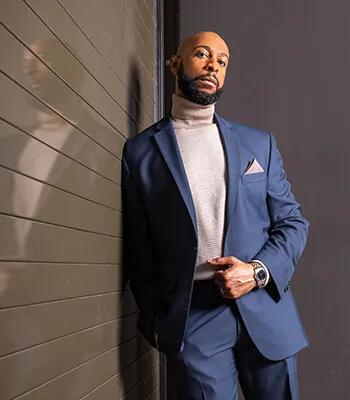
Dr. Tony Cruz-McLeod
“Yes. Probably. Maybe,” says Dr. Tony Cruz-McLeod of Wappingers Falls, New York, reflecting the uncertainty many feel. “But I have a fee-for-service office. It doesn’t affect my patient population. It’s a different ballgame.” According to Dr. Margaret Spargimino, a practice owner in Hooksett, New Hampshire, “I think we’re in one, but either people don’t see it or don’t want to.” As stressors go, she says, hiring is a far greater concern. Dr. Alex Planes, a prominent Florida dental entrepreneur, coach and host of the podcast Lifestream, echoed those sentiments. “I think we’re in a transitional recession,” he posits, “but the biggest challenge we face is human capital. I went from paying $30 to $35 [an hour] for a hygienist to $45 to $50 in two years.”
Dr. Meyleen Izquierdo of Weston, Florida, feels that we’re in a recession, citing the rising cost of just about everything, including supplies. “The problem for us is raising our fees. Patients choose fewer elective procedures or delay necessary treatment until it snowballs into something bigger.” Dr. Gabriela Flores adds that there are perhaps just too many nuances to consider. “It’s not a yes-or-no answer. It depends on where you are and the population you see.” Still, any lingering uncertainty didn’t stop her from buying a practice in Miami Beach in February.
“The problem for us is raising our fees. Patients choose fewer elective procedures or delay necessary treatment until it snowballs into something bigger.” -Dr. Meyleen Izquierdo
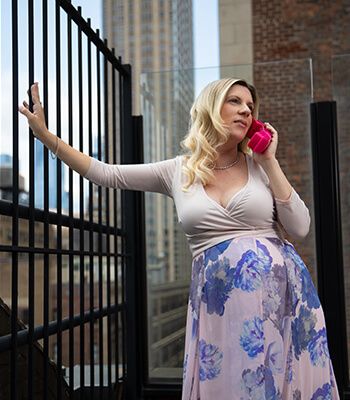
Dr. Meyleen Izquierdo
Of course, not all doctors’ assets are concentrated in their practices. Says Dr. Joke Alesh of Pawtucket, Rhode Island: “Business has definitely slowed down in my wedding and event planning business this year,” though she won’t unequivocally tie the slowdown to a recessionary economy. On the bright side, “I created [my businesses] to be lean. There’s not a lot of overhead, so it’s not a financial strain to keep them going.” As for her practice’s business results, those are more clear-cut. “There are always people who do and don’t have money. It doesn’t affect the way I’m building it. There are some things that people will always find value in.”
Recession-Proofing in 2023
While dentistry is no longer automatically recession-proof the way it was 30 years ago, it absolutely can be, according to our 40 Under 40—if practice owners take steps to make it so. “In dentistry, there are so many levers to pull,” Dr. Spargimino says. “For example, we currently don’t accept emergency patients, but I feel like if there are holes in the schedule, why not? If the winds change, you have to be able to shift.”
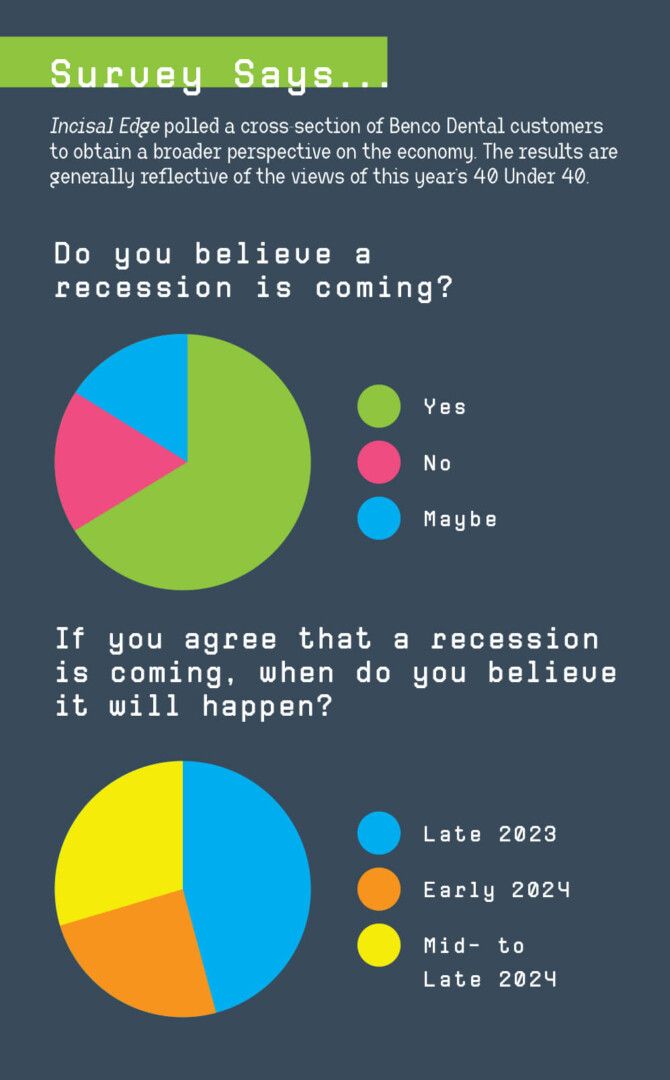 Dr. Ryan Robinson is a serious entrepreneurial dentist in Newark, Delaware, who’s doing big business—and the sheer size of his practices definitely shapes his perspective. “I’m more likely to feel a hit,” he says. “I can’t change as fast as someone with a handful of dentists and hygienists. When you scale, margins can shrink quickly.” At the same time, he’s energized by today’s challenges. “The prospect of a recession has actually accelerated my goals. When things are going well, there is no fear factor, people get a little bit lazy. And I think laziness creates things that fall off.”
Dr. Ryan Robinson is a serious entrepreneurial dentist in Newark, Delaware, who’s doing big business—and the sheer size of his practices definitely shapes his perspective. “I’m more likely to feel a hit,” he says. “I can’t change as fast as someone with a handful of dentists and hygienists. When you scale, margins can shrink quickly.” At the same time, he’s energized by today’s challenges. “The prospect of a recession has actually accelerated my goals. When things are going well, there is no fear factor, people get a little bit lazy. And I think laziness creates things that fall off.”
Of his efforts to date, he says, “All the things we’ve built are recession-proof. We don’t take shortcuts. We have a highly trained, high-performing team. I see people struggling, and they’re not engaging with their staffs. They’re also not measuring anything. They don’t have KPIs. I’ve taken the systematic approach and the people approach.” Now, he advises, is the ideal time for an unflinching look inward. “I have not seen, and do not anticipate seeing, anything that dentistry cannot withstand. But yes, for some people, a recession will put them in the corner and they won’t be able to fight their way out, like practices with aging populations or no plan for addressing competition.”
Other doctors point to specific strategic aspects with which they’ve had success. “Patients used to automatically trust what dentists said. That has changed,” Dr. Izquierdo says. “My philosophy is to recession-proof by being as honest as possible. I give patients options if I can, but I’m not going to compromise my ethics and have patients need to spend more later. Patients almost always say, ‘OK, let’s find a way to do it.’ ” Dr. Nicole Shinkawa, who joined her family’s practice in Fresno, California, observes that “We’re a general practice, but we take a lot of CE and invest in technology. It’s really nice that we do a little bit of everything, and that helps a lot toward recession-proofing.”
Dr. Cruz-McLeod is cognizant that his fee-for-service office may be, in some ways, more vulnerable to patients’ economic pressures, but “if you’re providing quality, people will pay for quality. I’ve never seen a clearance sale at Neiman Marcus. I’m sure Porsche runs commercials, but I don’t see them—yet people are still buying.” He’s partial to investing heavily in whatever makes him a better dentist, including 100 to 150 hours of CE annually. “Now you can maybe drop an insurance because you’re providing a level of care others in your neighborhood can’t. You can try something nobody else is, something that can drive the margins—Invisalign or Botox, for example. And remember, Google reviews are king. Ask patients to leave reviews. Most won’t do it, but one or two a week add up. I think we have 259 reviews, all five stars.”
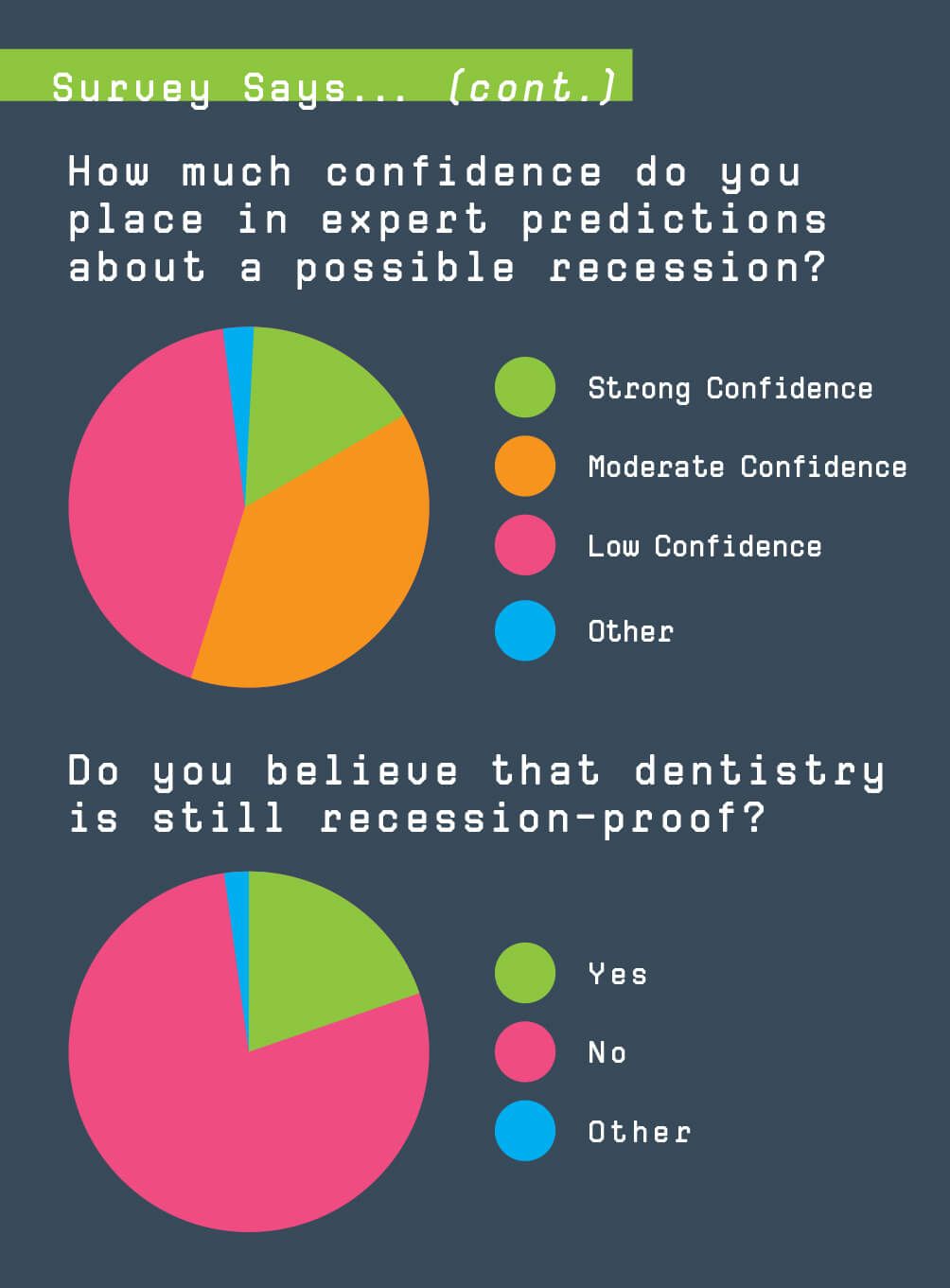 Coach and podcaster Dr. Planes says recession-proofing for young dentists must start early. “One of the hardest things is building a personal brand. Start while you’re in dental school or getting close to graduating.” Marketing, of course, is part of his preferred mix, and not just the free kind. “I spend about 6 or 7 percent of my collections on marketing, even though you can do free stories on social. Track your numbers. Your acquisition costs should be $100 to $150 [per patient].” Flexible payment options are a big help, too. “Seventy percent of my patients are financing. The days of hard cash or people paying with credit cards are pretty much done.” Most important: “You have to shut that back door. From that first contact, you have to be warm. Customer service, focus on core values and team alignment are critical.” Miss those targets, he says, and “you’re not only going to lose patients, but also team members.”
Coach and podcaster Dr. Planes says recession-proofing for young dentists must start early. “One of the hardest things is building a personal brand. Start while you’re in dental school or getting close to graduating.” Marketing, of course, is part of his preferred mix, and not just the free kind. “I spend about 6 or 7 percent of my collections on marketing, even though you can do free stories on social. Track your numbers. Your acquisition costs should be $100 to $150 [per patient].” Flexible payment options are a big help, too. “Seventy percent of my patients are financing. The days of hard cash or people paying with credit cards are pretty much done.” Most important: “You have to shut that back door. From that first contact, you have to be warm. Customer service, focus on core values and team alignment are critical.” Miss those targets, he says, and “you’re not only going to lose patients, but also team members.”
Optimistic, and Moving Forward
True, our 40 Under 40 agreed that starting or buying a practice costs more these days, and recession-proofing it takes work. But Dr. Steve Yusupov, a specialist in head-and-neck oncology in Roslyn, New York, says, “I think now is perfect timing.” He started working on his practice in 2021 and began seeing patients this June. “By definition, we’re no longer in the golden age of dentistry, but I think we’re in another, different golden age. Prioritize patient care and the business side takes care of itself.” He sees it every day. “In theory, people should not be spending on complex cosmetic cases. But they are. The rates are high, recession is at our doorstep, but people are still getting care and paying for it.”
“When you constantly hear about recession, it can be daunting at times. But if I keep serving my community and delivering great care, everything will be fine.” -Dr. Neelon Patel
The decidedly unhelpful feedback Dr. Reshma Baddaloo once received about hanging out a shingle: “Everyone said, ‘You’re crazy.’ ” She recently closed on her Miami practice anyway. Dr. Neelon Patel, of Naperville, Illinois, faced similar discouragement about her desired location in the Chicago suburbs. “People said, ‘You’re crazy, there’s too much competition.’ But you have to cancel out the background noise.” She opened in July 2022. “Owning your own practice is job security, control. Being a mom and wanting that freedom were my driving factors. Build-out expenses are higher, there are added costs, but it’s part of doing business. When you constantly hear about recession, it can be daunting at times. But if I keep serving my community and delivering great care, everything will be fine.”
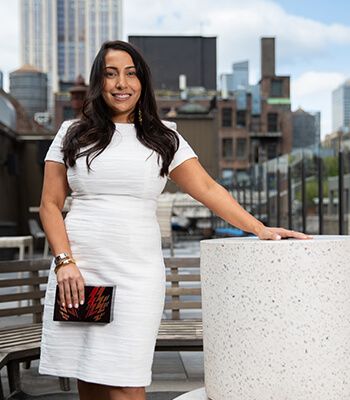
Dr. Neelon Patel
Adds Dr. Izquierdo, “There was never a time when I thought about letting this go. No chance. I always wanted to open my own practice. Nothing ventured, nothing gained. The chances of a dental practice failing are only something like 3 percent, even now.”
Dr. Flores, who opened her practice this February, says, “It’s all about niches. Nothing is recession-proof at the end of the day. That’s fine. I didn’t come into dentistry to do it the way everybody else does.” Did she consider postponing her plans? Or, considering the economic uncertainty, does she wish she had? “If you base all your decisions on whether there’s going to be a recession or not, you’re never going to make a decision. It’s like the old saying: ‘The best time to invest was 10 years ago.’ There’s always going to be something.”



